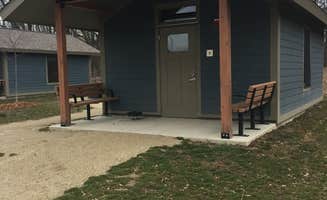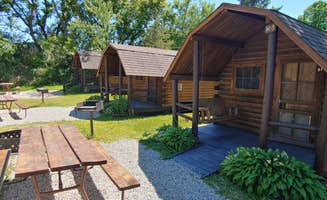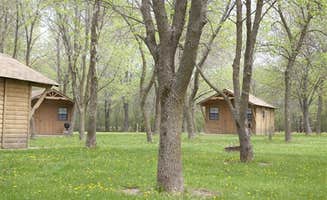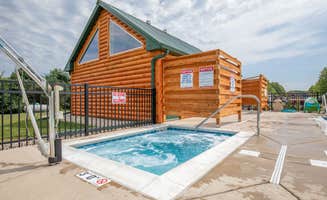Cabin accommodations near Schiller Park, Illinois range from basic shelters to modern lodging options within 60 miles of the city. The area sits at approximately 660 feet above sea level in the Des Plaines River watershed, with year-round accessibility despite Chicago's variable climate. Winter temperatures frequently drop below freezing from December through February, making heated cabin options particularly valuable during colder months.
What to do
**Paddling options: Lake access at Camp Bullfrog Lake allows kayaking on a small protected waterway. The rental equipment costs $15 per hour with life vests included. "The kayaks are $15 and hour and include life vests. The lake is pretty small but it was fun to putter around," notes a visitor to Camp Bullfrog Lake.
**Mountain biking: Extensive trail systems connect directly to Camp Bullfrog Lake campsites. "What's great about this location is the access to the miles and mile of MTB and hiking trails just out the front step of your campsite," shares a reviewer who appreciates breaking up the work week with midweek camping trips.
**Wildlife observation: Richard Bong State Recreation Area accommodates bird watchers with wetland habitat and accessible trails. "If you enjoy bird watching or rabbit spotting, this is a great place to go... I have seldom seen as many rabbits as we saw. There were relatively few campers during the week and just about every other campsite had at least a bunny or two," reports a camper at Sunset Campground.
What campers like
**Clean facilities: Shower buildings and restrooms receive regular attention at most cabin locations. "The bathrooms are modern. The campsites are well kept as are the grounds," notes a visitor to Camp Sullivan. Another reviewer at Turner Lake South mentions "The shower houses are dated, yet I have seen them clean and also not clean on busy camper weekends."
**Lake recreation: Small fishing boats and accessible piers provide water access without competing with larger watercraft. A Turner Lake South visitor explains, "Chain O Lakes in general get pretty busy on the water, but the state park is off the main part of the water system, so even a little fishingboat can be fun without the large speedboat wakes here."
**Stargazing opportunities: Clear skies provide nighttime viewing away from city lights. "Our first night there, we left the rain fly off of the tent and just enjoyed the stars and the satellites streaking across the sky," shares a camper at Sunset Campground.
What you should know
**Gate closure policies: Several campgrounds lock entrance gates overnight, restricting late arrival or early departure. "They lock the gates (both of them!) to the campground with a PADLOCK at night until 7 in the morning! I had to search for someone to let me out for my meeting. What if there was an emergency?" cautions a Camp Sullivan visitor.
**Firewood availability: Bundles cost around $5 with varying quality between locations. "Unfortunately the wood I bought from the camp store took forever to catch flames—my other two neighbors had the same issue," reports a visitor at Camp Bullfrog Lake. Another camper notes, "Free firewood and you can purchase more for just $5" at Camp Reinberg.
**Insect awareness: Mosquitoes and ticks require proper preparation, especially in wooded or wetland areas. "We're from the south, so we are used to mosquitoes, but I have seldom been around so many all at once," warns a Sunset Campground visitor, while another advises, "DO NOT FORGET your bug spray the files are huge."
Tips for camping with families
**Playground access: Multiple play areas provide recreational options for children. A Turner Lake South visitor notes, "There is so much to do at this campground. Horseback riding, archery, hiking, boating, fishing. There is also a park for the kids in several areas."
**Wildlife encounters: Managed raccoon populations require proper food storage. "The raccoons at night here are no joke. The second it's dusky, they come scavenging for absolutely anything food has touched. So basically, eat dinner and do s'mores early, then everything must be packed into cars for the night and all surfaces wiped down," advises a parent at Honeysuckle Hollow.
**Tick prevention: Parents with small children need containment strategies in wooded sites. "SO many ticks. With a baby crawling that needed to be set free, we were constantly doing checks. Luckily our screen house pop up on a tarp that was sprayed ahead for tick repellent plus a blanket on top of that did the trick," shares a parent at Honeysuckle Hollow Camping Area.
Tips from RVers
**Leveling considerations: Site preparation varies significantly between campgrounds. "Sites are all flattened and mulched but not too spacious. You cannot pull your vehicle by the site but they provide wagons and staffs are willing to help," explains an RVer at Camp Reinberg.
**Water access limitations: Hookup locations may require staff assistance or extra hose length. "The staff has to hook up a very very long hose and will bring it to your site. You can get water, it's just an inconvenience for you and them. But they do it with a good attitude," shares a visitor at Camp Reinberg.
**Site spacing: RV sites vary in proximity to neighbors and shade coverage. "We stayed in a modest pop up and still felt crowded. I supposed this would be a great camping area for anyone living in the city needing an escape, but as far as campgrounds go it was about 3x the price for less than half the space," notes a Chicago Northwest KOA visitor.





